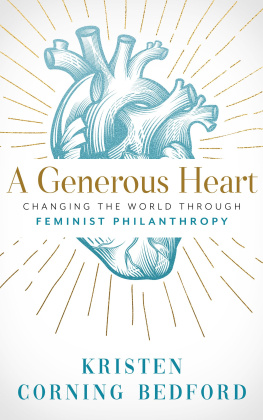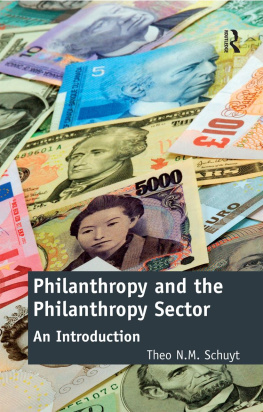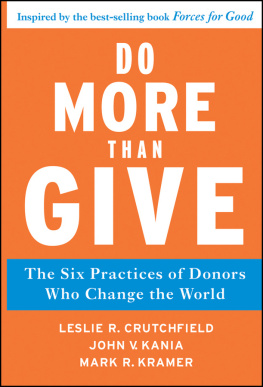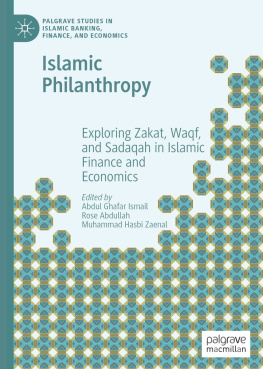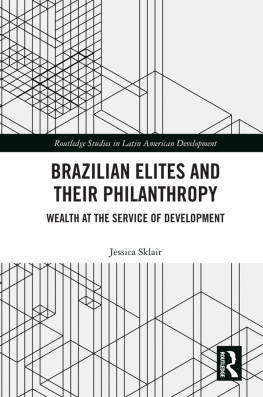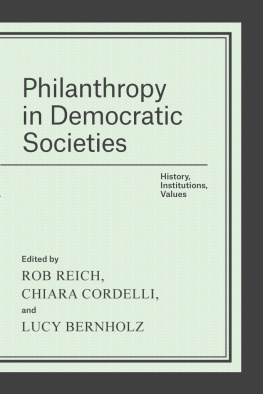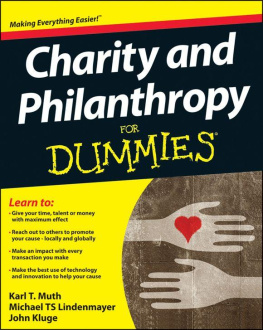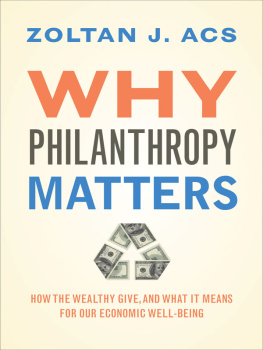Contents
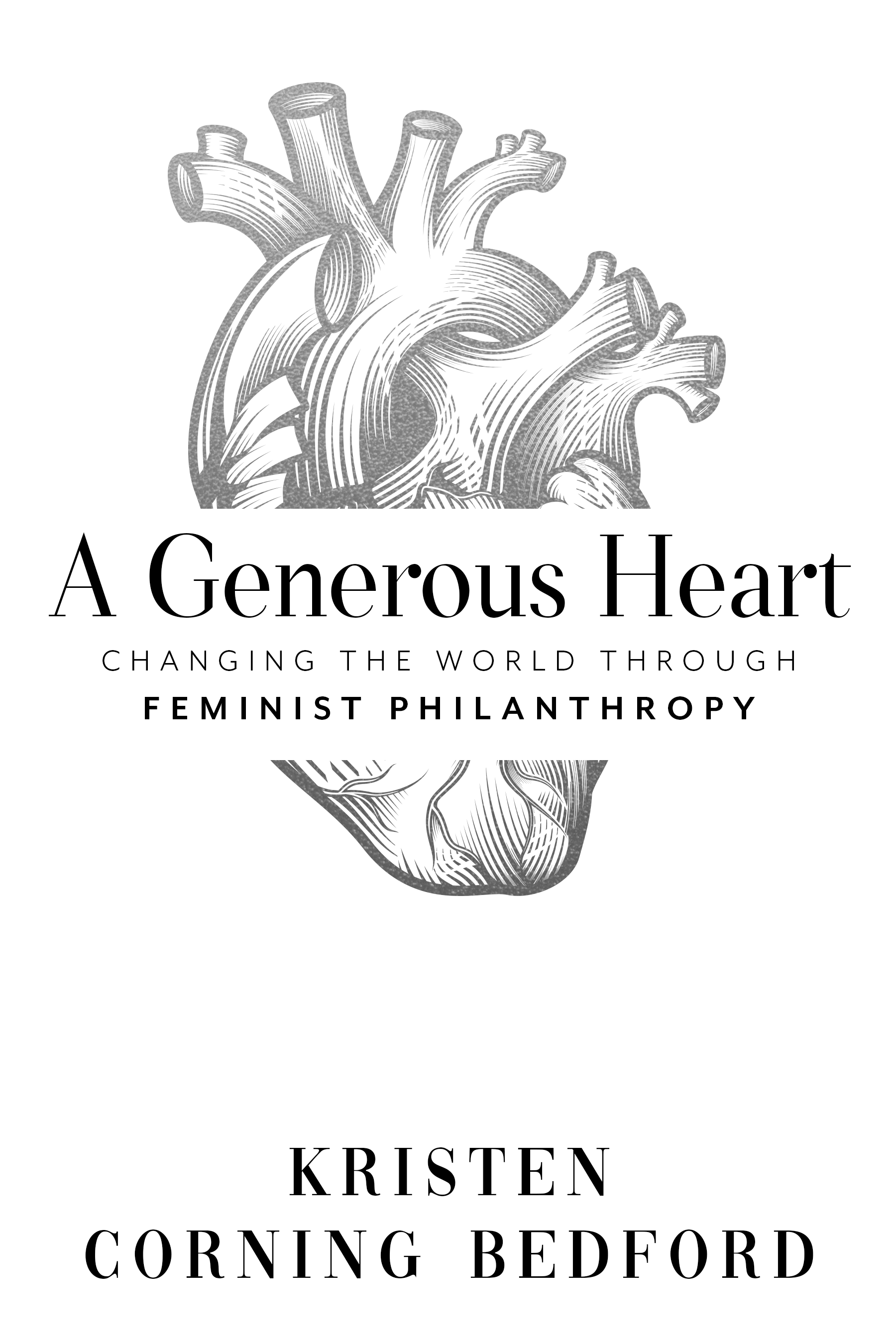
INTRODUCTION
IN THE EARLY MORNING HOURS OF AN OTHERWISE ORDINARY WEEKDAY, a shooting took place at a youth music venue in downtown Tacoma, Washington where I lived and worked. It was the first shooting like this that had happened in Tacoma for some time, and it was making headlines because it was in the heart of downtown and outside of a club which was operated by a well-known nonprofit organization. It also just so happened, in my role overseeing the grant program at the local Community Foundation, I had recently recommended funding for this new venture to provide teens with a place to gather and be creative, while receiving services that could help them get off the streets and away from gang violence. In the wake of the tragedy, I couldnt help but ask myself: had I encouraged support for something that wasnt viable, wasnt safe, wasnt in the best interest of the community?
When I got to work that morning, I sat in the boardroom with my boss, our CEO, under the still wet lettering of our newly adopted values, Integrity, Leadership, Innovation, Collaboration, to discuss our role and responsibility in the situation. I was questioning my due diligence and my complicity. Had I done the proper vetting? Could I confidently speak to the press, let alone our board of directors, about my recommended support of this organization? Was this music venue a benefit to our city or a magnet for troubled youth? Did I trust that the nonprofit was properly equipped to deal with these issues, and ensure the safety of their patrons and the wider community?
In retrospect I can see that I was asking the wrong questions. These are questions born of fear and power, of separateness and ego. These are questions asked by someone who bestows gifts from an ivory tower. And this was not the way I, or this foundation, wanted to operate. We were forging a new way of working with the community, and as our discussion continued that morning, I was reminded that the individuals running these programs were my trusted advisors. I valued their judgement and knowledge of the youth community they were working with, and I often relied on their expertise and leadership on youth issues. The path forward was clear: our partnership was meaningless if support was only offered when things were going well. In fact, partnership meant we should be there especially when problems arose. The CEO and I arranged a meeting with their staff and leadership, being clear upfront that their funding was not in jeopardy, to discuss their challenges and what we could do to further our support of their work.
The conversation that ensued was explicit and vulnerable. We discussed power dynamics and racial inequity and the challenges of working with a transient youth population in poverty and trauma. We laid our cards on the table: this isnt just your problem, this is a community problem in which we are partners; this is about what we are going to do together. In doing so, we made a commitment to construct a shared vision of addressing the youth violence we were both tackling with our varied resources, and took a small step toward solidarity. I could bring people to the table with political clout and financial resources, they could bring expertise and the youth voice. Collectively, we decided that the Community Foundation would convene a process with city leaders, other funders and youth that frequented the music club, with the intent to construct mutual goals around combating youth violence. It was a test of our desire to be a community convener, and the relationships and initiatives that came from this initial discussion changed the way a community engages with each other. It certainly changed me.
Our first gathering in that process stands out among all the other moments that came after. The adults were in business attire, accustomed to arriving to board room meetings. We were aware that these were young people with histories of gang involvement and school suspensions, which made us overly nice and contributed to the awkwardness in the room. The teens were confident but quiet, scanning the adults for intent. They had been selected to be part of this conversation because they were motivated to engage and strategize on how to decrease youth violence in our city - it was clear they understood the bias and discrimination they were walking into.
It was a pleasant afternoon, and the doors to the office stood open to let in a fresh breeze. To begin building relationships with each other, each of the adults paired off with a teen wed never met before. I stepped onto the deck overlooking Pacific Avenue with a young boy, maybe 16, along with several other pairings of adults and youth. We were instructed to stand back-to-back with each other and start stating facts about ourselves, one at a time, until we hit upon a commonality.
Back and forth we went, stating where we were born, where our grandparents came from, our birth order, our favorite food, our favorite color, our eye color, what we wanted to be when we grew up, what our parents did for a living. Nothing about us lined up. I dont think either of us thought wed get there. Then he said, Ive always wanted to travel to Japan. I want to learn Japanese. I whirled around, my eyes blazing, Me too! Oh my gosh, me too! We were chest to chest now, smiling at each other a ridiculous amount, like wed just won a contest. Beyond all the categorical factors of our exteriors and experiences, there was a common dream, a shared humanity. We stood like this, laughing and talking about travel goals and why Japan held a special place for each of us, listening to the other pairs whoop with laughter when they hit upon something they held in common.
Now, Im not going to say this connection changed the world. Or that there werent still systemic power dynamics very much at play in that room. I certainly couldnt tell you whether this young mans version of the story was as impactful as mine. But what I can attest to, quite emphatically, is that it was the beginning of a bold experiment in community engagement. As we all came back together around the board room table, with those values hanging over our heads, our conversation deepened. The energy had shifted. The adults seemed lighter, as if wed been reminded of who we were as individuals and why we were working with passion to make the world better in the first place. We were more authentic and vulnerable in our speech, noting that our titles didnt give us any more authority or agency in addressing the issues. In fact, it became clear that the experts in the room were those who had just finally been invited--the youth. In this space, the teens were emboldened to speak their truth and challenge our power. They were confident to question our intent and their ability to affect change. Together we recognized the opportunity to do things differently.
Toward the end of this meeting, one young woman pointed out that the working name of the group, Youth Violence Initiative, focused on the youth as being perpetrators of violence, rather than on the youth combating the violence. She suggested we reframe the conversation, calling ourselves the Youth Against Violence Initiative. She was, in fact, more direct than that when she stated, You should let us lead. A collective silence filled the room for a moment, and there was no discussion needed: with Youth Against Violence, those directly impacted would lead the conversation and the necessary change.
Due to this shift in power, a sustainable model of leadership was put in place, which understood reciprocity as a guiding principle. Recognizing and honoring our interdependence set the tone for all that we could accomplish. The Youth Against Violence community convenings culminated in young people being hired at the Community Foundation to help launch the first Youth Philanthropy Board. It also informed our strategy to support arts in the schools as a lever to keep kids in school, and it deepened our partnerships, from nonprofits to other funders and city leadership. This experience reframed my understanding of the potential of a Community Foundation, moving from a reactive grantmaker and fund holder for wealthy families to a dynamic community partner and strategic convener.

